Comprehensive Report: Travel and Tourism Sector in London
VerifiedAdded on 2020/01/28
|16
|5437
|199
Report
AI Summary
This report provides a detailed analysis of the travel and tourism sector, with a specific focus on London. It begins with an introduction to the industry and its growth, followed by an examination of its historical development, highlighting key milestones such as the Grand Tour and the impact of the Industrial Revolution. The report then delves into the structure of the sector, outlining the roles of hospitality, tour operators, travel agents, ancillary services, accommodation, and transportation. It further explores the functions of government bodies and international agencies, such as the Department for Culture, Media and Sport and the UNWTO, and analyzes the influence of local and national economic policies on the sector. The report also discusses the implications of travel and tourism in different countries, considering factors such as political stability and economic policies. It then examines factors affecting tourism demand and the ways supply has adapted, followed by a discussion of the positive and negative impacts of tourism, including economic, environmental, and social aspects, and strategies to mitigate negative effects and maximize positive outcomes. The report concludes with a summary of the findings and a list of references.

Travel And Tourism Sector
Paraphrase This Document
Need a fresh take? Get an instant paraphrase of this document with our AI Paraphraser
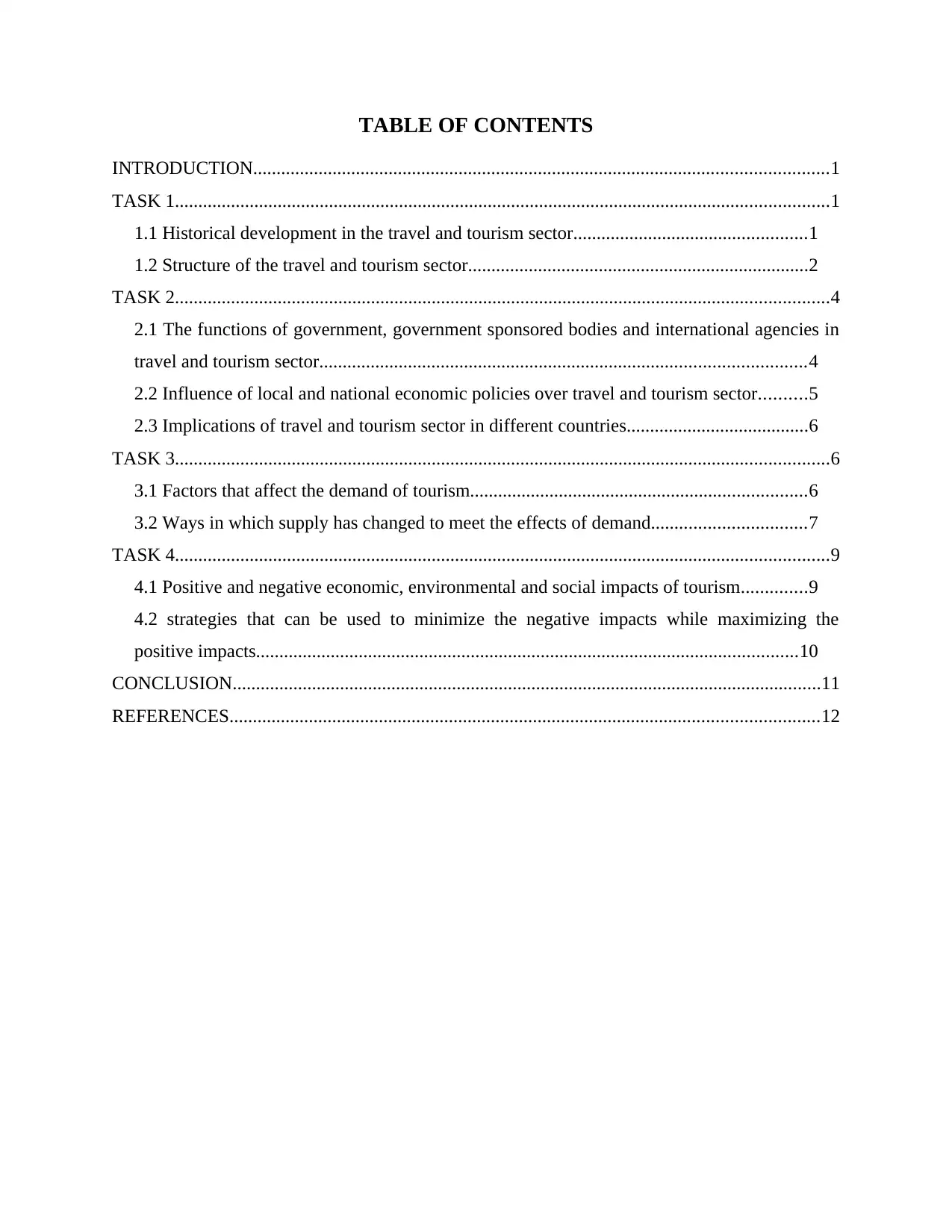
TABLE OF CONTENTS
INTRODUCTION...........................................................................................................................1
TASK 1............................................................................................................................................1
1.1 Historical development in the travel and tourism sector..................................................1
1.2 Structure of the travel and tourism sector.........................................................................2
TASK 2............................................................................................................................................4
2.1 The functions of government, government sponsored bodies and international agencies in
travel and tourism sector........................................................................................................4
2.2 Influence of local and national economic policies over travel and tourism sector..........5
2.3 Implications of travel and tourism sector in different countries.......................................6
TASK 3............................................................................................................................................6
3.1 Factors that affect the demand of tourism........................................................................6
3.2 Ways in which supply has changed to meet the effects of demand.................................7
TASK 4............................................................................................................................................9
4.1 Positive and negative economic, environmental and social impacts of tourism..............9
4.2 strategies that can be used to minimize the negative impacts while maximizing the
positive impacts....................................................................................................................10
CONCLUSION..............................................................................................................................11
REFERENCES..............................................................................................................................12
INTRODUCTION...........................................................................................................................1
TASK 1............................................................................................................................................1
1.1 Historical development in the travel and tourism sector..................................................1
1.2 Structure of the travel and tourism sector.........................................................................2
TASK 2............................................................................................................................................4
2.1 The functions of government, government sponsored bodies and international agencies in
travel and tourism sector........................................................................................................4
2.2 Influence of local and national economic policies over travel and tourism sector..........5
2.3 Implications of travel and tourism sector in different countries.......................................6
TASK 3............................................................................................................................................6
3.1 Factors that affect the demand of tourism........................................................................6
3.2 Ways in which supply has changed to meet the effects of demand.................................7
TASK 4............................................................................................................................................9
4.1 Positive and negative economic, environmental and social impacts of tourism..............9
4.2 strategies that can be used to minimize the negative impacts while maximizing the
positive impacts....................................................................................................................10
CONCLUSION..............................................................................................................................11
REFERENCES..............................................................................................................................12
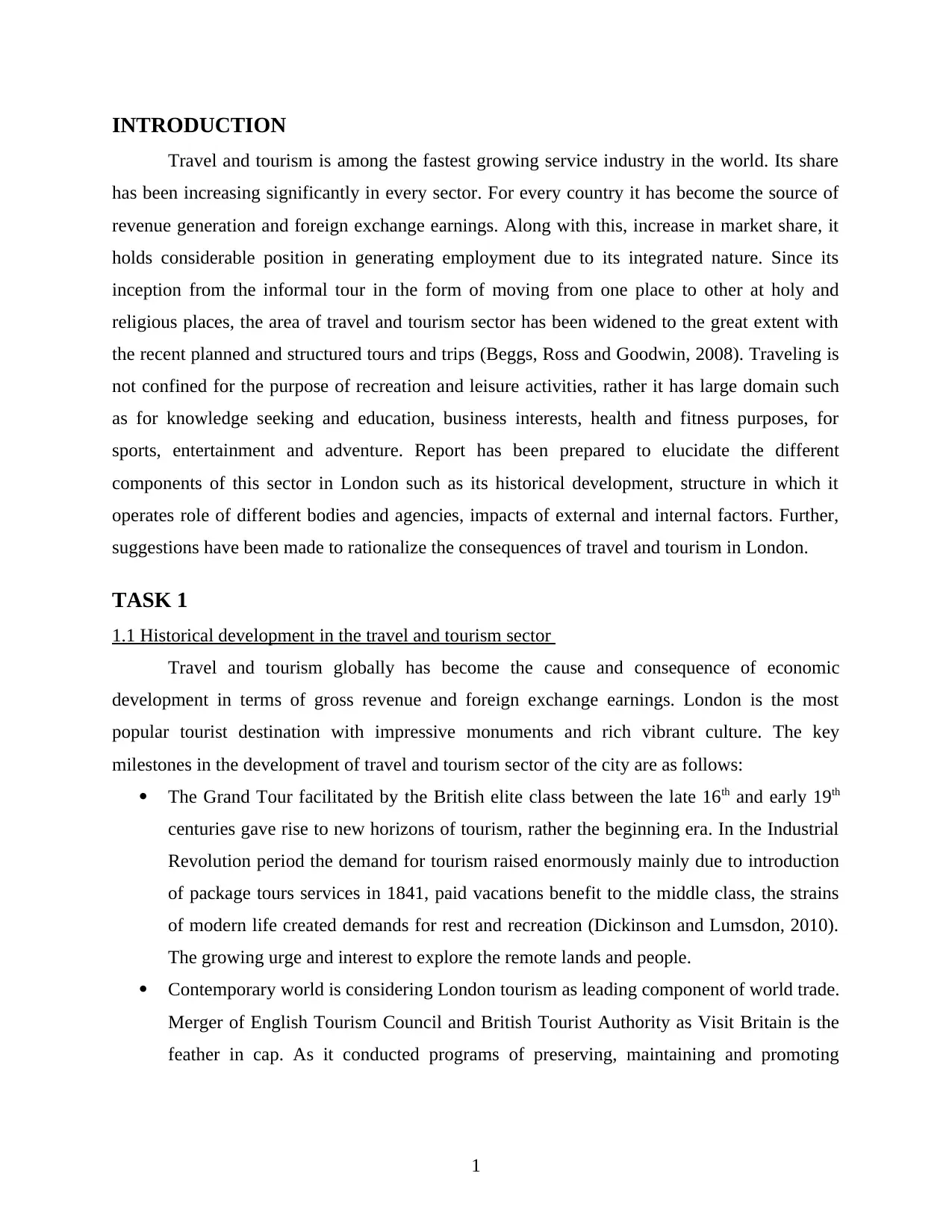
INTRODUCTION
Travel and tourism is among the fastest growing service industry in the world. Its share
has been increasing significantly in every sector. For every country it has become the source of
revenue generation and foreign exchange earnings. Along with this, increase in market share, it
holds considerable position in generating employment due to its integrated nature. Since its
inception from the informal tour in the form of moving from one place to other at holy and
religious places, the area of travel and tourism sector has been widened to the great extent with
the recent planned and structured tours and trips (Beggs, Ross and Goodwin, 2008). Traveling is
not confined for the purpose of recreation and leisure activities, rather it has large domain such
as for knowledge seeking and education, business interests, health and fitness purposes, for
sports, entertainment and adventure. Report has been prepared to elucidate the different
components of this sector in London such as its historical development, structure in which it
operates role of different bodies and agencies, impacts of external and internal factors. Further,
suggestions have been made to rationalize the consequences of travel and tourism in London.
TASK 1
1.1 Historical development in the travel and tourism sector
Travel and tourism globally has become the cause and consequence of economic
development in terms of gross revenue and foreign exchange earnings. London is the most
popular tourist destination with impressive monuments and rich vibrant culture. The key
milestones in the development of travel and tourism sector of the city are as follows:
The Grand Tour facilitated by the British elite class between the late 16th and early 19th
centuries gave rise to new horizons of tourism, rather the beginning era. In the Industrial
Revolution period the demand for tourism raised enormously mainly due to introduction
of package tours services in 1841, paid vacations benefit to the middle class, the strains
of modern life created demands for rest and recreation (Dickinson and Lumsdon, 2010).
The growing urge and interest to explore the remote lands and people.
Contemporary world is considering London tourism as leading component of world trade.
Merger of English Tourism Council and British Tourist Authority as Visit Britain is the
feather in cap. As it conducted programs of preserving, maintaining and promoting
1
Travel and tourism is among the fastest growing service industry in the world. Its share
has been increasing significantly in every sector. For every country it has become the source of
revenue generation and foreign exchange earnings. Along with this, increase in market share, it
holds considerable position in generating employment due to its integrated nature. Since its
inception from the informal tour in the form of moving from one place to other at holy and
religious places, the area of travel and tourism sector has been widened to the great extent with
the recent planned and structured tours and trips (Beggs, Ross and Goodwin, 2008). Traveling is
not confined for the purpose of recreation and leisure activities, rather it has large domain such
as for knowledge seeking and education, business interests, health and fitness purposes, for
sports, entertainment and adventure. Report has been prepared to elucidate the different
components of this sector in London such as its historical development, structure in which it
operates role of different bodies and agencies, impacts of external and internal factors. Further,
suggestions have been made to rationalize the consequences of travel and tourism in London.
TASK 1
1.1 Historical development in the travel and tourism sector
Travel and tourism globally has become the cause and consequence of economic
development in terms of gross revenue and foreign exchange earnings. London is the most
popular tourist destination with impressive monuments and rich vibrant culture. The key
milestones in the development of travel and tourism sector of the city are as follows:
The Grand Tour facilitated by the British elite class between the late 16th and early 19th
centuries gave rise to new horizons of tourism, rather the beginning era. In the Industrial
Revolution period the demand for tourism raised enormously mainly due to introduction
of package tours services in 1841, paid vacations benefit to the middle class, the strains
of modern life created demands for rest and recreation (Dickinson and Lumsdon, 2010).
The growing urge and interest to explore the remote lands and people.
Contemporary world is considering London tourism as leading component of world trade.
Merger of English Tourism Council and British Tourist Authority as Visit Britain is the
feather in cap. As it conducted programs of preserving, maintaining and promoting
1
⊘ This is a preview!⊘
Do you want full access?
Subscribe today to unlock all pages.

Trusted by 1+ million students worldwide
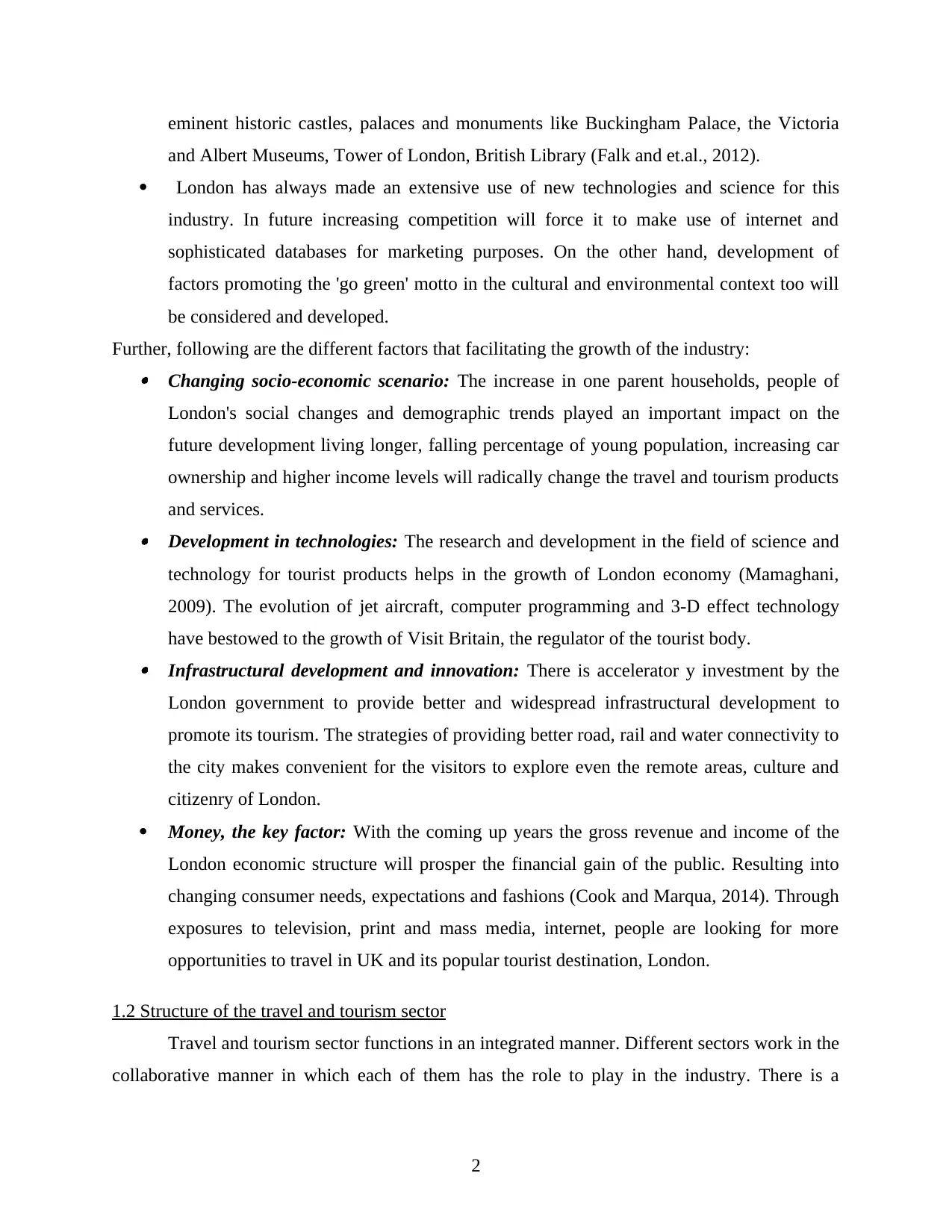
eminent historic castles, palaces and monuments like Buckingham Palace, the Victoria
and Albert Museums, Tower of London, British Library (Falk and et.al., 2012).
London has always made an extensive use of new technologies and science for this
industry. In future increasing competition will force it to make use of internet and
sophisticated databases for marketing purposes. On the other hand, development of
factors promoting the 'go green' motto in the cultural and environmental context too will
be considered and developed.
Further, following are the different factors that facilitating the growth of the industry: Changing socio-economic scenario: The increase in one parent households, people of
London's social changes and demographic trends played an important impact on the
future development living longer, falling percentage of young population, increasing car
ownership and higher income levels will radically change the travel and tourism products
and services. Development in technologies: The research and development in the field of science and
technology for tourist products helps in the growth of London economy (Mamaghani,
2009). The evolution of jet aircraft, computer programming and 3-D effect technology
have bestowed to the growth of Visit Britain, the regulator of the tourist body. Infrastructural development and innovation: There is accelerator y investment by the
London government to provide better and widespread infrastructural development to
promote its tourism. The strategies of providing better road, rail and water connectivity to
the city makes convenient for the visitors to explore even the remote areas, culture and
citizenry of London.
Money, the key factor: With the coming up years the gross revenue and income of the
London economic structure will prosper the financial gain of the public. Resulting into
changing consumer needs, expectations and fashions (Cook and Marqua, 2014). Through
exposures to television, print and mass media, internet, people are looking for more
opportunities to travel in UK and its popular tourist destination, London.
1.2 Structure of the travel and tourism sector
Travel and tourism sector functions in an integrated manner. Different sectors work in the
collaborative manner in which each of them has the role to play in the industry. There is a
2
and Albert Museums, Tower of London, British Library (Falk and et.al., 2012).
London has always made an extensive use of new technologies and science for this
industry. In future increasing competition will force it to make use of internet and
sophisticated databases for marketing purposes. On the other hand, development of
factors promoting the 'go green' motto in the cultural and environmental context too will
be considered and developed.
Further, following are the different factors that facilitating the growth of the industry: Changing socio-economic scenario: The increase in one parent households, people of
London's social changes and demographic trends played an important impact on the
future development living longer, falling percentage of young population, increasing car
ownership and higher income levels will radically change the travel and tourism products
and services. Development in technologies: The research and development in the field of science and
technology for tourist products helps in the growth of London economy (Mamaghani,
2009). The evolution of jet aircraft, computer programming and 3-D effect technology
have bestowed to the growth of Visit Britain, the regulator of the tourist body. Infrastructural development and innovation: There is accelerator y investment by the
London government to provide better and widespread infrastructural development to
promote its tourism. The strategies of providing better road, rail and water connectivity to
the city makes convenient for the visitors to explore even the remote areas, culture and
citizenry of London.
Money, the key factor: With the coming up years the gross revenue and income of the
London economic structure will prosper the financial gain of the public. Resulting into
changing consumer needs, expectations and fashions (Cook and Marqua, 2014). Through
exposures to television, print and mass media, internet, people are looking for more
opportunities to travel in UK and its popular tourist destination, London.
1.2 Structure of the travel and tourism sector
Travel and tourism sector functions in an integrated manner. Different sectors work in the
collaborative manner in which each of them has the role to play in the industry. There is a
2
Paraphrase This Document
Need a fresh take? Get an instant paraphrase of this document with our AI Paraphraser
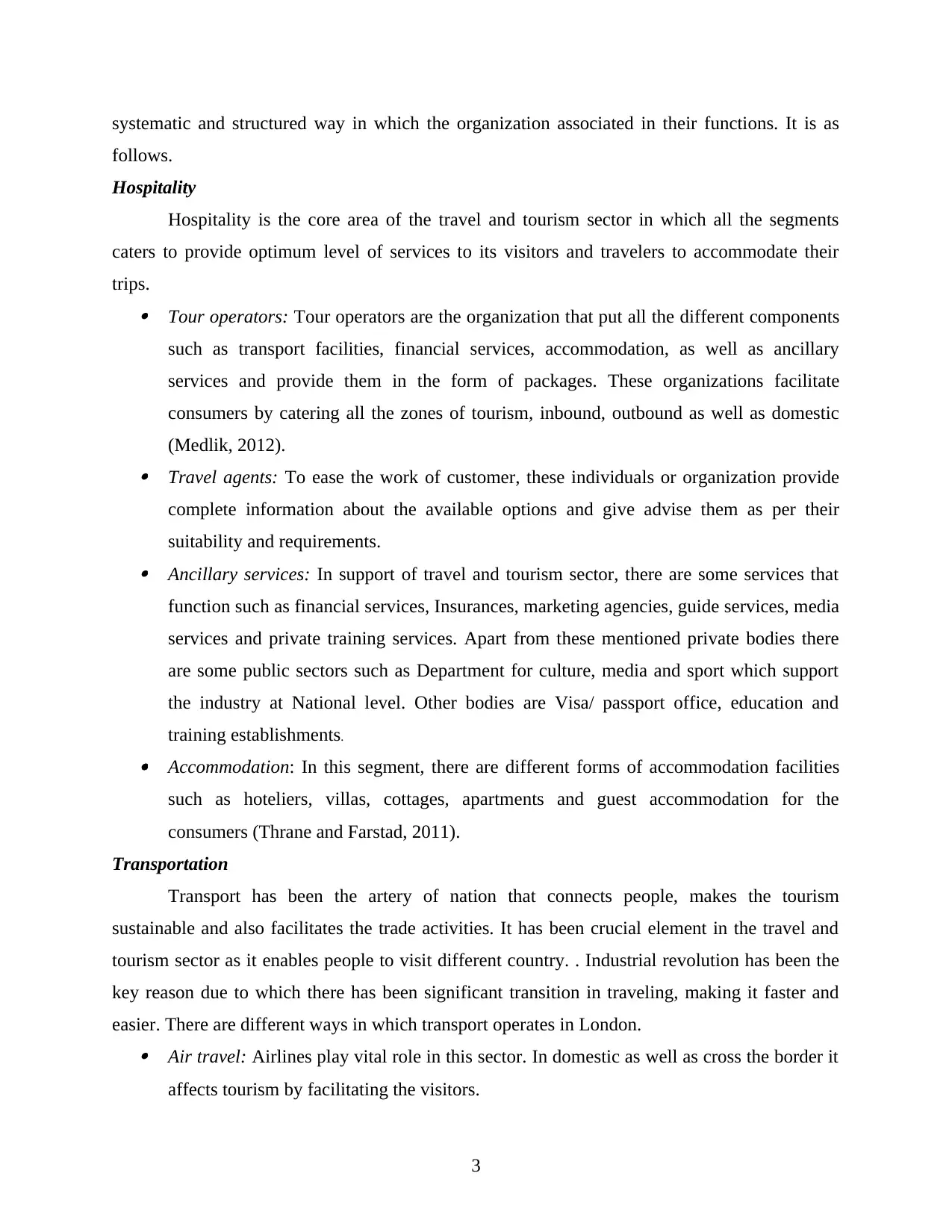
systematic and structured way in which the organization associated in their functions. It is as
follows.
Hospitality
Hospitality is the core area of the travel and tourism sector in which all the segments
caters to provide optimum level of services to its visitors and travelers to accommodate their
trips. Tour operators: Tour operators are the organization that put all the different components
such as transport facilities, financial services, accommodation, as well as ancillary
services and provide them in the form of packages. These organizations facilitate
consumers by catering all the zones of tourism, inbound, outbound as well as domestic
(Medlik, 2012). Travel agents: To ease the work of customer, these individuals or organization provide
complete information about the available options and give advise them as per their
suitability and requirements. Ancillary services: In support of travel and tourism sector, there are some services that
function such as financial services, Insurances, marketing agencies, guide services, media
services and private training services. Apart from these mentioned private bodies there
are some public sectors such as Department for culture, media and sport which support
the industry at National level. Other bodies are Visa/ passport office, education and
training establishments. Accommodation: In this segment, there are different forms of accommodation facilities
such as hoteliers, villas, cottages, apartments and guest accommodation for the
consumers (Thrane and Farstad, 2011).
Transportation
Transport has been the artery of nation that connects people, makes the tourism
sustainable and also facilitates the trade activities. It has been crucial element in the travel and
tourism sector as it enables people to visit different country. . Industrial revolution has been the
key reason due to which there has been significant transition in traveling, making it faster and
easier. There are different ways in which transport operates in London. Air travel: Airlines play vital role in this sector. In domestic as well as cross the border it
affects tourism by facilitating the visitors.
3
follows.
Hospitality
Hospitality is the core area of the travel and tourism sector in which all the segments
caters to provide optimum level of services to its visitors and travelers to accommodate their
trips. Tour operators: Tour operators are the organization that put all the different components
such as transport facilities, financial services, accommodation, as well as ancillary
services and provide them in the form of packages. These organizations facilitate
consumers by catering all the zones of tourism, inbound, outbound as well as domestic
(Medlik, 2012). Travel agents: To ease the work of customer, these individuals or organization provide
complete information about the available options and give advise them as per their
suitability and requirements. Ancillary services: In support of travel and tourism sector, there are some services that
function such as financial services, Insurances, marketing agencies, guide services, media
services and private training services. Apart from these mentioned private bodies there
are some public sectors such as Department for culture, media and sport which support
the industry at National level. Other bodies are Visa/ passport office, education and
training establishments. Accommodation: In this segment, there are different forms of accommodation facilities
such as hoteliers, villas, cottages, apartments and guest accommodation for the
consumers (Thrane and Farstad, 2011).
Transportation
Transport has been the artery of nation that connects people, makes the tourism
sustainable and also facilitates the trade activities. It has been crucial element in the travel and
tourism sector as it enables people to visit different country. . Industrial revolution has been the
key reason due to which there has been significant transition in traveling, making it faster and
easier. There are different ways in which transport operates in London. Air travel: Airlines play vital role in this sector. In domestic as well as cross the border it
affects tourism by facilitating the visitors.
3
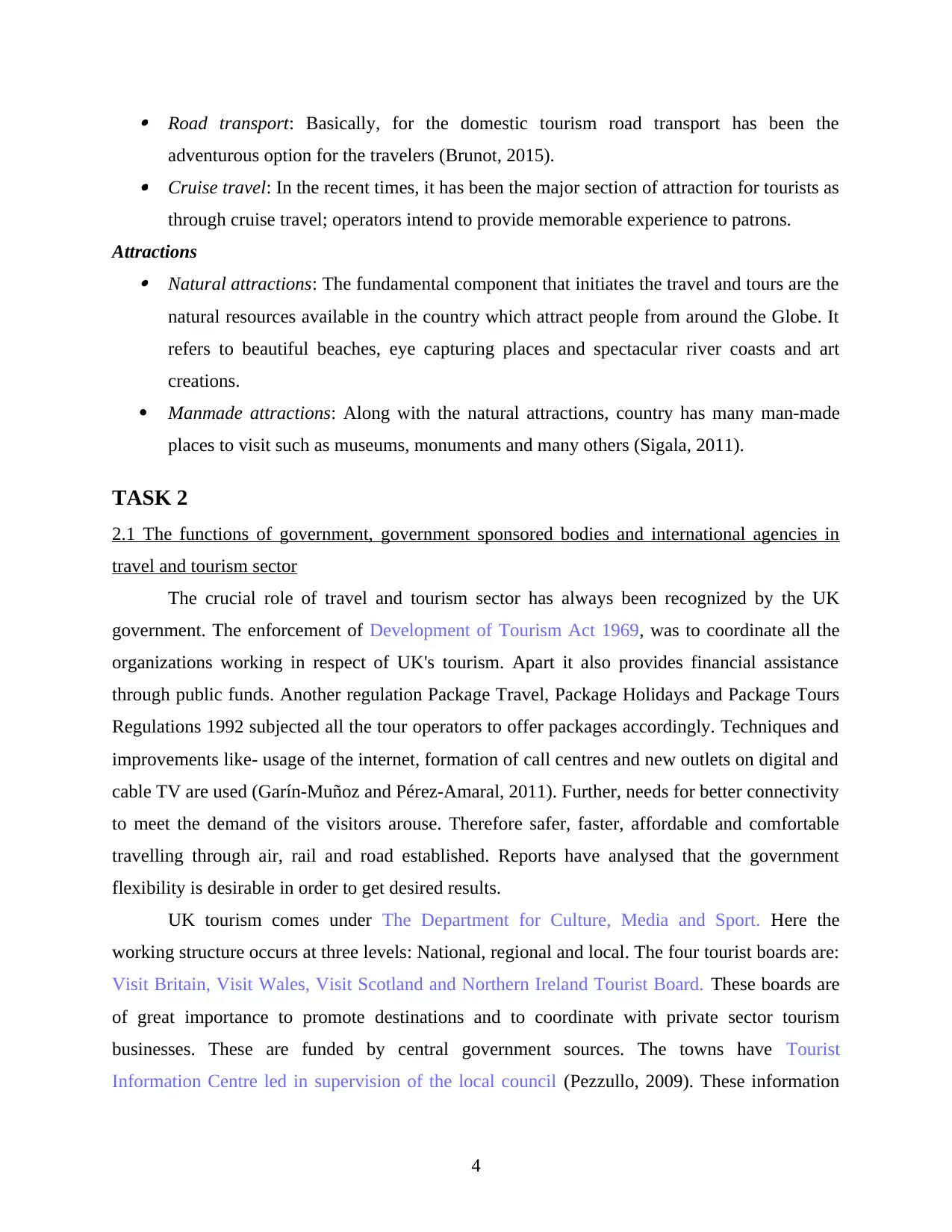
Road transport: Basically, for the domestic tourism road transport has been the
adventurous option for the travelers (Brunot, 2015). Cruise travel: In the recent times, it has been the major section of attraction for tourists as
through cruise travel; operators intend to provide memorable experience to patrons.
Attractions Natural attractions: The fundamental component that initiates the travel and tours are the
natural resources available in the country which attract people from around the Globe. It
refers to beautiful beaches, eye capturing places and spectacular river coasts and art
creations.
Manmade attractions: Along with the natural attractions, country has many man-made
places to visit such as museums, monuments and many others (Sigala, 2011).
TASK 2
2.1 The functions of government, government sponsored bodies and international agencies in
travel and tourism sector
The crucial role of travel and tourism sector has always been recognized by the UK
government. The enforcement of Development of Tourism Act 1969, was to coordinate all the
organizations working in respect of UK's tourism. Apart it also provides financial assistance
through public funds. Another regulation Package Travel, Package Holidays and Package Tours
Regulations 1992 subjected all the tour operators to offer packages accordingly. Techniques and
improvements like- usage of the internet, formation of call centres and new outlets on digital and
cable TV are used (Garín-Muñoz and Pérez-Amaral, 2011). Further, needs for better connectivity
to meet the demand of the visitors arouse. Therefore safer, faster, affordable and comfortable
travelling through air, rail and road established. Reports have analysed that the government
flexibility is desirable in order to get desired results.
UK tourism comes under The Department for Culture, Media and Sport. Here the
working structure occurs at three levels: National, regional and local. The four tourist boards are:
Visit Britain, Visit Wales, Visit Scotland and Northern Ireland Tourist Board. These boards are
of great importance to promote destinations and to coordinate with private sector tourism
businesses. These are funded by central government sources. The towns have Tourist
Information Centre led in supervision of the local council (Pezzullo, 2009). These information
4
adventurous option for the travelers (Brunot, 2015). Cruise travel: In the recent times, it has been the major section of attraction for tourists as
through cruise travel; operators intend to provide memorable experience to patrons.
Attractions Natural attractions: The fundamental component that initiates the travel and tours are the
natural resources available in the country which attract people from around the Globe. It
refers to beautiful beaches, eye capturing places and spectacular river coasts and art
creations.
Manmade attractions: Along with the natural attractions, country has many man-made
places to visit such as museums, monuments and many others (Sigala, 2011).
TASK 2
2.1 The functions of government, government sponsored bodies and international agencies in
travel and tourism sector
The crucial role of travel and tourism sector has always been recognized by the UK
government. The enforcement of Development of Tourism Act 1969, was to coordinate all the
organizations working in respect of UK's tourism. Apart it also provides financial assistance
through public funds. Another regulation Package Travel, Package Holidays and Package Tours
Regulations 1992 subjected all the tour operators to offer packages accordingly. Techniques and
improvements like- usage of the internet, formation of call centres and new outlets on digital and
cable TV are used (Garín-Muñoz and Pérez-Amaral, 2011). Further, needs for better connectivity
to meet the demand of the visitors arouse. Therefore safer, faster, affordable and comfortable
travelling through air, rail and road established. Reports have analysed that the government
flexibility is desirable in order to get desired results.
UK tourism comes under The Department for Culture, Media and Sport. Here the
working structure occurs at three levels: National, regional and local. The four tourist boards are:
Visit Britain, Visit Wales, Visit Scotland and Northern Ireland Tourist Board. These boards are
of great importance to promote destinations and to coordinate with private sector tourism
businesses. These are funded by central government sources. The towns have Tourist
Information Centre led in supervision of the local council (Pezzullo, 2009). These information
4
⊘ This is a preview!⊘
Do you want full access?
Subscribe today to unlock all pages.

Trusted by 1+ million students worldwide
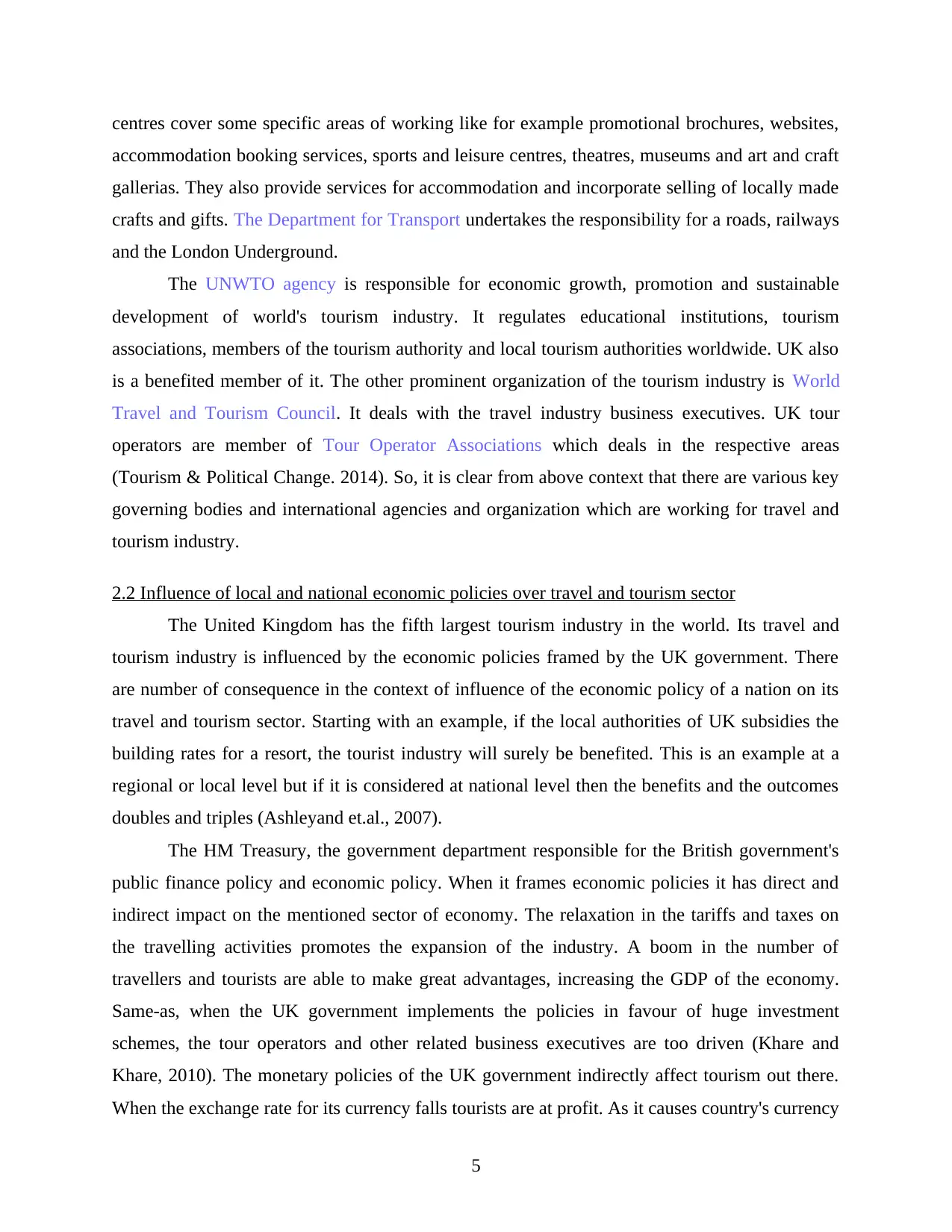
centres cover some specific areas of working like for example promotional brochures, websites,
accommodation booking services, sports and leisure centres, theatres, museums and art and craft
gallerias. They also provide services for accommodation and incorporate selling of locally made
crafts and gifts. The Department for Transport undertakes the responsibility for a roads, railways
and the London Underground.
The UNWTO agency is responsible for economic growth, promotion and sustainable
development of world's tourism industry. It regulates educational institutions, tourism
associations, members of the tourism authority and local tourism authorities worldwide. UK also
is a benefited member of it. The other prominent organization of the tourism industry is World
Travel and Tourism Council. It deals with the travel industry business executives. UK tour
operators are member of Tour Operator Associations which deals in the respective areas
(Tourism & Political Change. 2014). So, it is clear from above context that there are various key
governing bodies and international agencies and organization which are working for travel and
tourism industry.
2.2 Influence of local and national economic policies over travel and tourism sector
The United Kingdom has the fifth largest tourism industry in the world. Its travel and
tourism industry is influenced by the economic policies framed by the UK government. There
are number of consequence in the context of influence of the economic policy of a nation on its
travel and tourism sector. Starting with an example, if the local authorities of UK subsidies the
building rates for a resort, the tourist industry will surely be benefited. This is an example at a
regional or local level but if it is considered at national level then the benefits and the outcomes
doubles and triples (Ashleyand et.al., 2007).
The HM Treasury, the government department responsible for the British government's
public finance policy and economic policy. When it frames economic policies it has direct and
indirect impact on the mentioned sector of economy. The relaxation in the tariffs and taxes on
the travelling activities promotes the expansion of the industry. A boom in the number of
travellers and tourists are able to make great advantages, increasing the GDP of the economy.
Same-as, when the UK government implements the policies in favour of huge investment
schemes, the tour operators and other related business executives are too driven (Khare and
Khare, 2010). The monetary policies of the UK government indirectly affect tourism out there.
When the exchange rate for its currency falls tourists are at profit. As it causes country's currency
5
accommodation booking services, sports and leisure centres, theatres, museums and art and craft
gallerias. They also provide services for accommodation and incorporate selling of locally made
crafts and gifts. The Department for Transport undertakes the responsibility for a roads, railways
and the London Underground.
The UNWTO agency is responsible for economic growth, promotion and sustainable
development of world's tourism industry. It regulates educational institutions, tourism
associations, members of the tourism authority and local tourism authorities worldwide. UK also
is a benefited member of it. The other prominent organization of the tourism industry is World
Travel and Tourism Council. It deals with the travel industry business executives. UK tour
operators are member of Tour Operator Associations which deals in the respective areas
(Tourism & Political Change. 2014). So, it is clear from above context that there are various key
governing bodies and international agencies and organization which are working for travel and
tourism industry.
2.2 Influence of local and national economic policies over travel and tourism sector
The United Kingdom has the fifth largest tourism industry in the world. Its travel and
tourism industry is influenced by the economic policies framed by the UK government. There
are number of consequence in the context of influence of the economic policy of a nation on its
travel and tourism sector. Starting with an example, if the local authorities of UK subsidies the
building rates for a resort, the tourist industry will surely be benefited. This is an example at a
regional or local level but if it is considered at national level then the benefits and the outcomes
doubles and triples (Ashleyand et.al., 2007).
The HM Treasury, the government department responsible for the British government's
public finance policy and economic policy. When it frames economic policies it has direct and
indirect impact on the mentioned sector of economy. The relaxation in the tariffs and taxes on
the travelling activities promotes the expansion of the industry. A boom in the number of
travellers and tourists are able to make great advantages, increasing the GDP of the economy.
Same-as, when the UK government implements the policies in favour of huge investment
schemes, the tour operators and other related business executives are too driven (Khare and
Khare, 2010). The monetary policies of the UK government indirectly affect tourism out there.
When the exchange rate for its currency falls tourists are at profit. As it causes country's currency
5
Paraphrase This Document
Need a fresh take? Get an instant paraphrase of this document with our AI Paraphraser
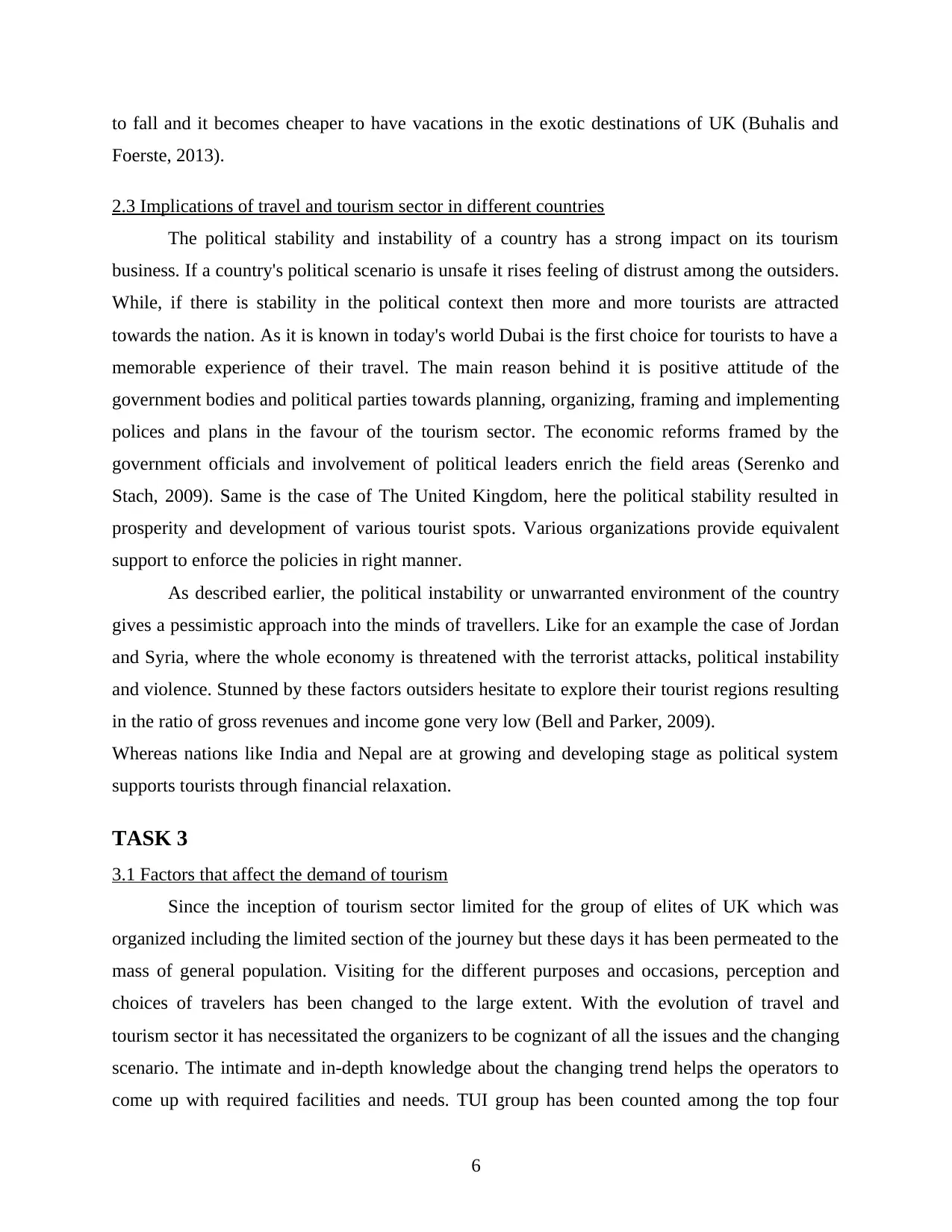
to fall and it becomes cheaper to have vacations in the exotic destinations of UK (Buhalis and
Foerste, 2013).
2.3 Implications of travel and tourism sector in different countries
The political stability and instability of a country has a strong impact on its tourism
business. If a country's political scenario is unsafe it rises feeling of distrust among the outsiders.
While, if there is stability in the political context then more and more tourists are attracted
towards the nation. As it is known in today's world Dubai is the first choice for tourists to have a
memorable experience of their travel. The main reason behind it is positive attitude of the
government bodies and political parties towards planning, organizing, framing and implementing
polices and plans in the favour of the tourism sector. The economic reforms framed by the
government officials and involvement of political leaders enrich the field areas (Serenko and
Stach, 2009). Same is the case of The United Kingdom, here the political stability resulted in
prosperity and development of various tourist spots. Various organizations provide equivalent
support to enforce the policies in right manner.
As described earlier, the political instability or unwarranted environment of the country
gives a pessimistic approach into the minds of travellers. Like for an example the case of Jordan
and Syria, where the whole economy is threatened with the terrorist attacks, political instability
and violence. Stunned by these factors outsiders hesitate to explore their tourist regions resulting
in the ratio of gross revenues and income gone very low (Bell and Parker, 2009).
Whereas nations like India and Nepal are at growing and developing stage as political system
supports tourists through financial relaxation.
TASK 3
3.1 Factors that affect the demand of tourism
Since the inception of tourism sector limited for the group of elites of UK which was
organized including the limited section of the journey but these days it has been permeated to the
mass of general population. Visiting for the different purposes and occasions, perception and
choices of travelers has been changed to the large extent. With the evolution of travel and
tourism sector it has necessitated the organizers to be cognizant of all the issues and the changing
scenario. The intimate and in-depth knowledge about the changing trend helps the operators to
come up with required facilities and needs. TUI group has been counted among the top four
6
Foerste, 2013).
2.3 Implications of travel and tourism sector in different countries
The political stability and instability of a country has a strong impact on its tourism
business. If a country's political scenario is unsafe it rises feeling of distrust among the outsiders.
While, if there is stability in the political context then more and more tourists are attracted
towards the nation. As it is known in today's world Dubai is the first choice for tourists to have a
memorable experience of their travel. The main reason behind it is positive attitude of the
government bodies and political parties towards planning, organizing, framing and implementing
polices and plans in the favour of the tourism sector. The economic reforms framed by the
government officials and involvement of political leaders enrich the field areas (Serenko and
Stach, 2009). Same is the case of The United Kingdom, here the political stability resulted in
prosperity and development of various tourist spots. Various organizations provide equivalent
support to enforce the policies in right manner.
As described earlier, the political instability or unwarranted environment of the country
gives a pessimistic approach into the minds of travellers. Like for an example the case of Jordan
and Syria, where the whole economy is threatened with the terrorist attacks, political instability
and violence. Stunned by these factors outsiders hesitate to explore their tourist regions resulting
in the ratio of gross revenues and income gone very low (Bell and Parker, 2009).
Whereas nations like India and Nepal are at growing and developing stage as political system
supports tourists through financial relaxation.
TASK 3
3.1 Factors that affect the demand of tourism
Since the inception of tourism sector limited for the group of elites of UK which was
organized including the limited section of the journey but these days it has been permeated to the
mass of general population. Visiting for the different purposes and occasions, perception and
choices of travelers has been changed to the large extent. With the evolution of travel and
tourism sector it has necessitated the organizers to be cognizant of all the issues and the changing
scenario. The intimate and in-depth knowledge about the changing trend helps the operators to
come up with required facilities and needs. TUI group has been counted among the top four
6
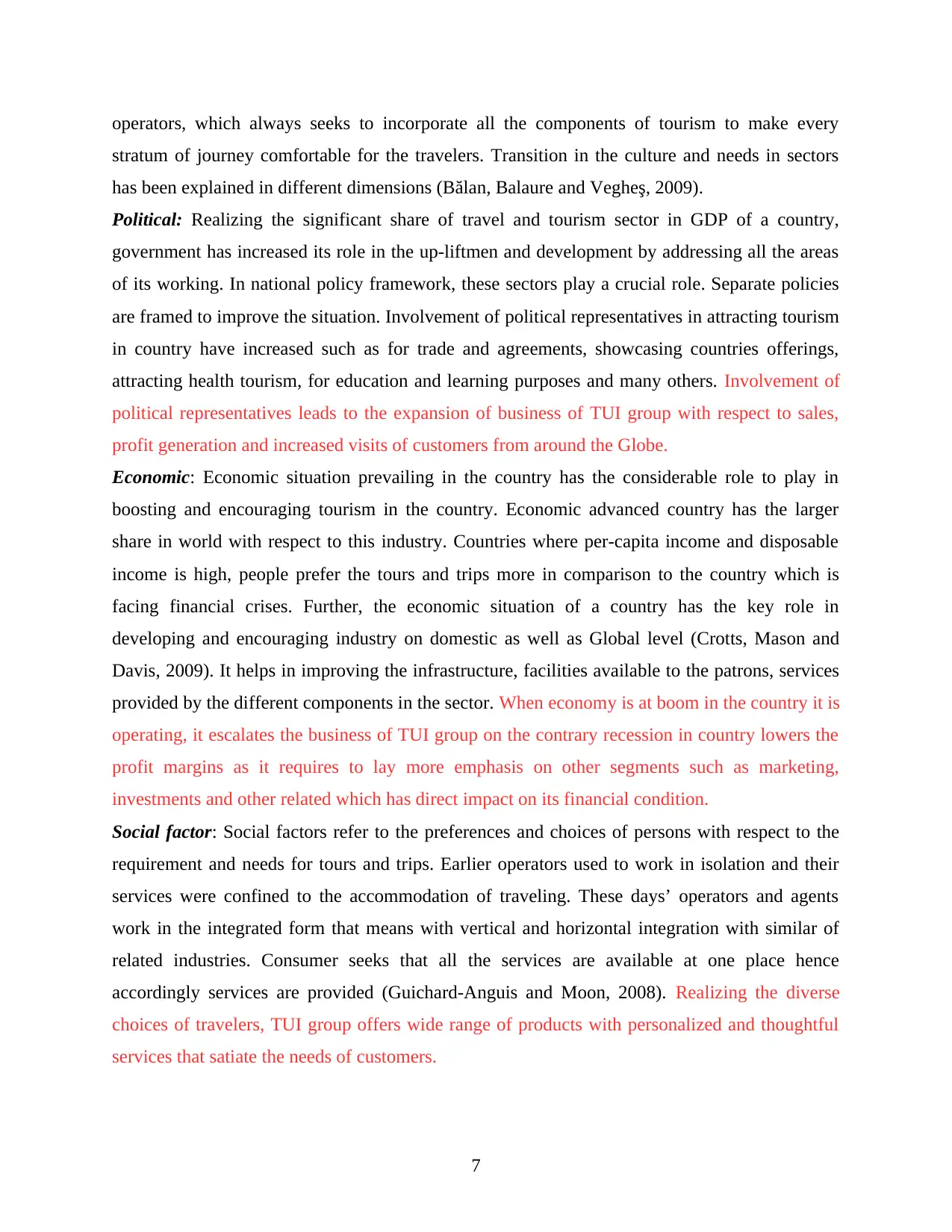
operators, which always seeks to incorporate all the components of tourism to make every
stratum of journey comfortable for the travelers. Transition in the culture and needs in sectors
has been explained in different dimensions (Bălan, Balaure and Vegheş, 2009).
Political: Realizing the significant share of travel and tourism sector in GDP of a country,
government has increased its role in the up-liftmen and development by addressing all the areas
of its working. In national policy framework, these sectors play a crucial role. Separate policies
are framed to improve the situation. Involvement of political representatives in attracting tourism
in country have increased such as for trade and agreements, showcasing countries offerings,
attracting health tourism, for education and learning purposes and many others. Involvement of
political representatives leads to the expansion of business of TUI group with respect to sales,
profit generation and increased visits of customers from around the Globe.
Economic: Economic situation prevailing in the country has the considerable role to play in
boosting and encouraging tourism in the country. Economic advanced country has the larger
share in world with respect to this industry. Countries where per-capita income and disposable
income is high, people prefer the tours and trips more in comparison to the country which is
facing financial crises. Further, the economic situation of a country has the key role in
developing and encouraging industry on domestic as well as Global level (Crotts, Mason and
Davis, 2009). It helps in improving the infrastructure, facilities available to the patrons, services
provided by the different components in the sector. When economy is at boom in the country it is
operating, it escalates the business of TUI group on the contrary recession in country lowers the
profit margins as it requires to lay more emphasis on other segments such as marketing,
investments and other related which has direct impact on its financial condition.
Social factor: Social factors refer to the preferences and choices of persons with respect to the
requirement and needs for tours and trips. Earlier operators used to work in isolation and their
services were confined to the accommodation of traveling. These days’ operators and agents
work in the integrated form that means with vertical and horizontal integration with similar of
related industries. Consumer seeks that all the services are available at one place hence
accordingly services are provided (Guichard-Anguis and Moon, 2008). Realizing the diverse
choices of travelers, TUI group offers wide range of products with personalized and thoughtful
services that satiate the needs of customers.
7
stratum of journey comfortable for the travelers. Transition in the culture and needs in sectors
has been explained in different dimensions (Bălan, Balaure and Vegheş, 2009).
Political: Realizing the significant share of travel and tourism sector in GDP of a country,
government has increased its role in the up-liftmen and development by addressing all the areas
of its working. In national policy framework, these sectors play a crucial role. Separate policies
are framed to improve the situation. Involvement of political representatives in attracting tourism
in country have increased such as for trade and agreements, showcasing countries offerings,
attracting health tourism, for education and learning purposes and many others. Involvement of
political representatives leads to the expansion of business of TUI group with respect to sales,
profit generation and increased visits of customers from around the Globe.
Economic: Economic situation prevailing in the country has the considerable role to play in
boosting and encouraging tourism in the country. Economic advanced country has the larger
share in world with respect to this industry. Countries where per-capita income and disposable
income is high, people prefer the tours and trips more in comparison to the country which is
facing financial crises. Further, the economic situation of a country has the key role in
developing and encouraging industry on domestic as well as Global level (Crotts, Mason and
Davis, 2009). It helps in improving the infrastructure, facilities available to the patrons, services
provided by the different components in the sector. When economy is at boom in the country it is
operating, it escalates the business of TUI group on the contrary recession in country lowers the
profit margins as it requires to lay more emphasis on other segments such as marketing,
investments and other related which has direct impact on its financial condition.
Social factor: Social factors refer to the preferences and choices of persons with respect to the
requirement and needs for tours and trips. Earlier operators used to work in isolation and their
services were confined to the accommodation of traveling. These days’ operators and agents
work in the integrated form that means with vertical and horizontal integration with similar of
related industries. Consumer seeks that all the services are available at one place hence
accordingly services are provided (Guichard-Anguis and Moon, 2008). Realizing the diverse
choices of travelers, TUI group offers wide range of products with personalized and thoughtful
services that satiate the needs of customers.
7
⊘ This is a preview!⊘
Do you want full access?
Subscribe today to unlock all pages.

Trusted by 1+ million students worldwide
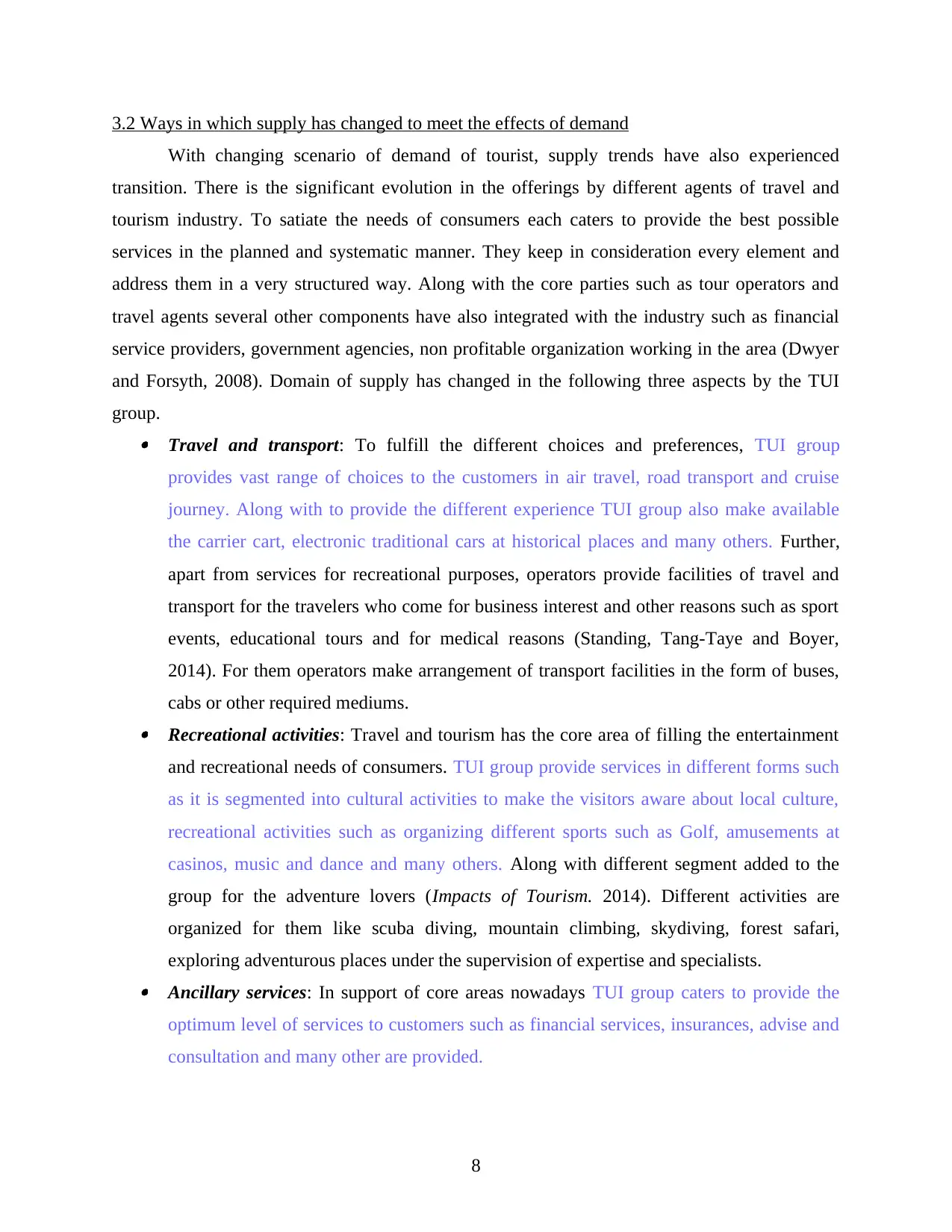
3.2 Ways in which supply has changed to meet the effects of demand
With changing scenario of demand of tourist, supply trends have also experienced
transition. There is the significant evolution in the offerings by different agents of travel and
tourism industry. To satiate the needs of consumers each caters to provide the best possible
services in the planned and systematic manner. They keep in consideration every element and
address them in a very structured way. Along with the core parties such as tour operators and
travel agents several other components have also integrated with the industry such as financial
service providers, government agencies, non profitable organization working in the area (Dwyer
and Forsyth, 2008). Domain of supply has changed in the following three aspects by the TUI
group. Travel and transport: To fulfill the different choices and preferences, TUI group
provides vast range of choices to the customers in air travel, road transport and cruise
journey. Along with to provide the different experience TUI group also make available
the carrier cart, electronic traditional cars at historical places and many others. Further,
apart from services for recreational purposes, operators provide facilities of travel and
transport for the travelers who come for business interest and other reasons such as sport
events, educational tours and for medical reasons (Standing, Tang-Taye and Boyer,
2014). For them operators make arrangement of transport facilities in the form of buses,
cabs or other required mediums. Recreational activities: Travel and tourism has the core area of filling the entertainment
and recreational needs of consumers. TUI group provide services in different forms such
as it is segmented into cultural activities to make the visitors aware about local culture,
recreational activities such as organizing different sports such as Golf, amusements at
casinos, music and dance and many others. Along with different segment added to the
group for the adventure lovers (Impacts of Tourism. 2014). Different activities are
organized for them like scuba diving, mountain climbing, skydiving, forest safari,
exploring adventurous places under the supervision of expertise and specialists. Ancillary services: In support of core areas nowadays TUI group caters to provide the
optimum level of services to customers such as financial services, insurances, advise and
consultation and many other are provided.
8
With changing scenario of demand of tourist, supply trends have also experienced
transition. There is the significant evolution in the offerings by different agents of travel and
tourism industry. To satiate the needs of consumers each caters to provide the best possible
services in the planned and systematic manner. They keep in consideration every element and
address them in a very structured way. Along with the core parties such as tour operators and
travel agents several other components have also integrated with the industry such as financial
service providers, government agencies, non profitable organization working in the area (Dwyer
and Forsyth, 2008). Domain of supply has changed in the following three aspects by the TUI
group. Travel and transport: To fulfill the different choices and preferences, TUI group
provides vast range of choices to the customers in air travel, road transport and cruise
journey. Along with to provide the different experience TUI group also make available
the carrier cart, electronic traditional cars at historical places and many others. Further,
apart from services for recreational purposes, operators provide facilities of travel and
transport for the travelers who come for business interest and other reasons such as sport
events, educational tours and for medical reasons (Standing, Tang-Taye and Boyer,
2014). For them operators make arrangement of transport facilities in the form of buses,
cabs or other required mediums. Recreational activities: Travel and tourism has the core area of filling the entertainment
and recreational needs of consumers. TUI group provide services in different forms such
as it is segmented into cultural activities to make the visitors aware about local culture,
recreational activities such as organizing different sports such as Golf, amusements at
casinos, music and dance and many others. Along with different segment added to the
group for the adventure lovers (Impacts of Tourism. 2014). Different activities are
organized for them like scuba diving, mountain climbing, skydiving, forest safari,
exploring adventurous places under the supervision of expertise and specialists. Ancillary services: In support of core areas nowadays TUI group caters to provide the
optimum level of services to customers such as financial services, insurances, advise and
consultation and many other are provided.
8
Paraphrase This Document
Need a fresh take? Get an instant paraphrase of this document with our AI Paraphraser
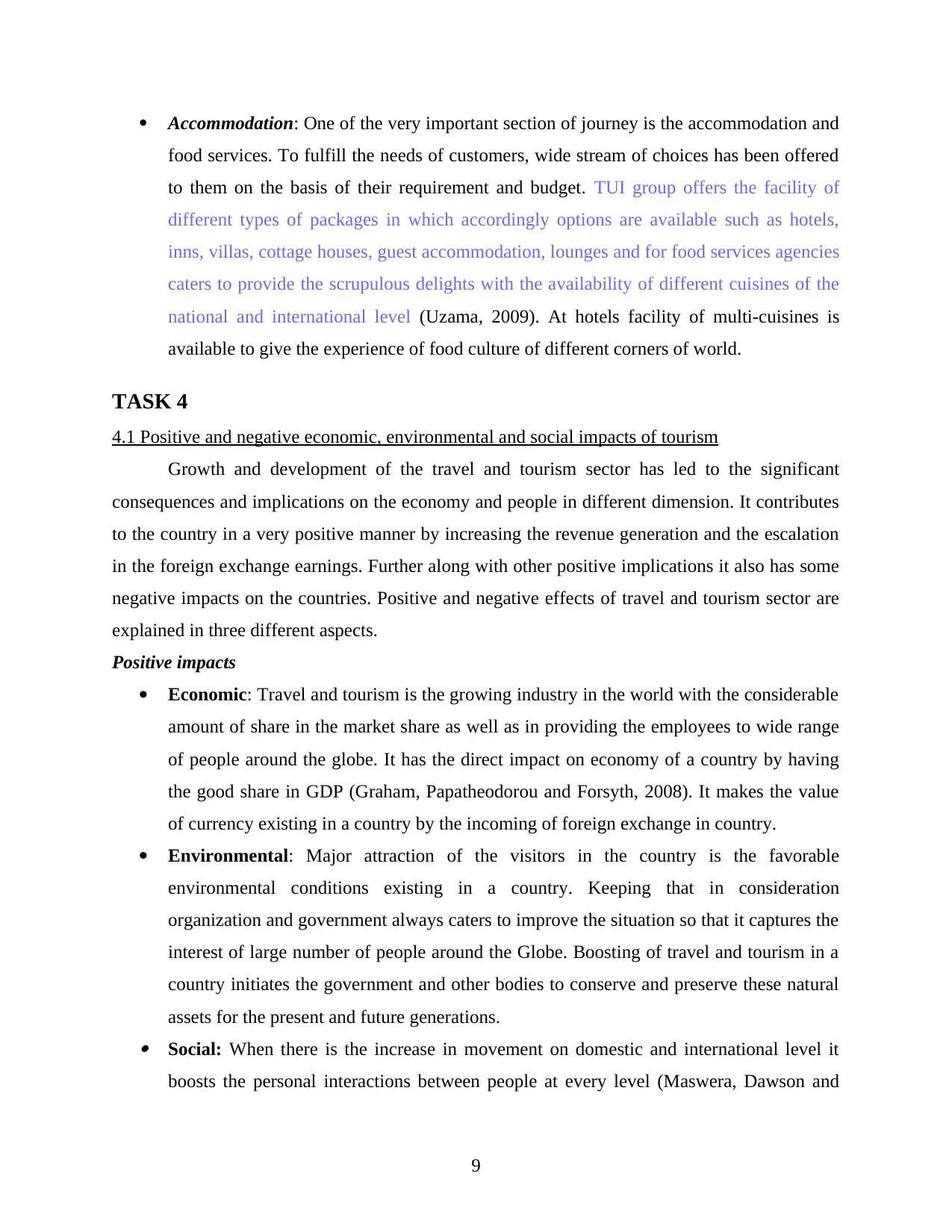
Accommodation: One of the very important section of journey is the accommodation and
food services. To fulfill the needs of customers, wide stream of choices has been offered
to them on the basis of their requirement and budget. TUI group offers the facility of
different types of packages in which accordingly options are available such as hotels,
inns, villas, cottage houses, guest accommodation, lounges and for food services agencies
caters to provide the scrupulous delights with the availability of different cuisines of the
national and international level (Uzama, 2009). At hotels facility of multi-cuisines is
available to give the experience of food culture of different corners of world.
TASK 4
4.1 Positive and negative economic, environmental and social impacts of tourism
Growth and development of the travel and tourism sector has led to the significant
consequences and implications on the economy and people in different dimension. It contributes
to the country in a very positive manner by increasing the revenue generation and the escalation
in the foreign exchange earnings. Further along with other positive implications it also has some
negative impacts on the countries. Positive and negative effects of travel and tourism sector are
explained in three different aspects.
Positive impacts
Economic: Travel and tourism is the growing industry in the world with the considerable
amount of share in the market share as well as in providing the employees to wide range
of people around the globe. It has the direct impact on economy of a country by having
the good share in GDP (Graham, Papatheodorou and Forsyth, 2008). It makes the value
of currency existing in a country by the incoming of foreign exchange in country.
Environmental: Major attraction of the visitors in the country is the favorable
environmental conditions existing in a country. Keeping that in consideration
organization and government always caters to improve the situation so that it captures the
interest of large number of people around the Globe. Boosting of travel and tourism in a
country initiates the government and other bodies to conserve and preserve these natural
assets for the present and future generations. Social: When there is the increase in movement on domestic and international level it
boosts the personal interactions between people at every level (Maswera, Dawson and
9
food services. To fulfill the needs of customers, wide stream of choices has been offered
to them on the basis of their requirement and budget. TUI group offers the facility of
different types of packages in which accordingly options are available such as hotels,
inns, villas, cottage houses, guest accommodation, lounges and for food services agencies
caters to provide the scrupulous delights with the availability of different cuisines of the
national and international level (Uzama, 2009). At hotels facility of multi-cuisines is
available to give the experience of food culture of different corners of world.
TASK 4
4.1 Positive and negative economic, environmental and social impacts of tourism
Growth and development of the travel and tourism sector has led to the significant
consequences and implications on the economy and people in different dimension. It contributes
to the country in a very positive manner by increasing the revenue generation and the escalation
in the foreign exchange earnings. Further along with other positive implications it also has some
negative impacts on the countries. Positive and negative effects of travel and tourism sector are
explained in three different aspects.
Positive impacts
Economic: Travel and tourism is the growing industry in the world with the considerable
amount of share in the market share as well as in providing the employees to wide range
of people around the globe. It has the direct impact on economy of a country by having
the good share in GDP (Graham, Papatheodorou and Forsyth, 2008). It makes the value
of currency existing in a country by the incoming of foreign exchange in country.
Environmental: Major attraction of the visitors in the country is the favorable
environmental conditions existing in a country. Keeping that in consideration
organization and government always caters to improve the situation so that it captures the
interest of large number of people around the Globe. Boosting of travel and tourism in a
country initiates the government and other bodies to conserve and preserve these natural
assets for the present and future generations. Social: When there is the increase in movement on domestic and international level it
boosts the personal interactions between people at every level (Maswera, Dawson and
9
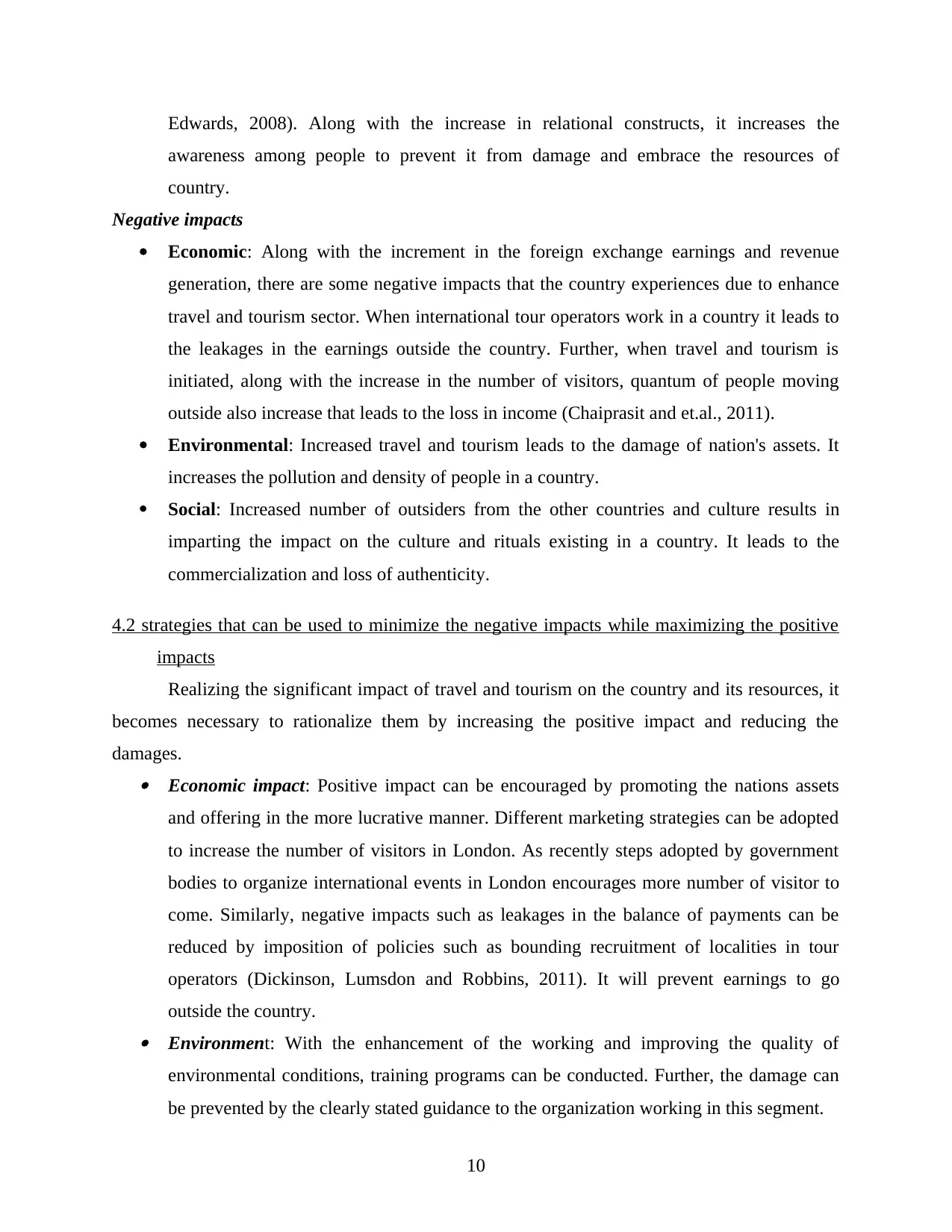
Edwards, 2008). Along with the increase in relational constructs, it increases the
awareness among people to prevent it from damage and embrace the resources of
country.
Negative impacts
Economic: Along with the increment in the foreign exchange earnings and revenue
generation, there are some negative impacts that the country experiences due to enhance
travel and tourism sector. When international tour operators work in a country it leads to
the leakages in the earnings outside the country. Further, when travel and tourism is
initiated, along with the increase in the number of visitors, quantum of people moving
outside also increase that leads to the loss in income (Chaiprasit and et.al., 2011).
Environmental: Increased travel and tourism leads to the damage of nation's assets. It
increases the pollution and density of people in a country.
Social: Increased number of outsiders from the other countries and culture results in
imparting the impact on the culture and rituals existing in a country. It leads to the
commercialization and loss of authenticity.
4.2 strategies that can be used to minimize the negative impacts while maximizing the positive
impacts
Realizing the significant impact of travel and tourism on the country and its resources, it
becomes necessary to rationalize them by increasing the positive impact and reducing the
damages. Economic impact: Positive impact can be encouraged by promoting the nations assets
and offering in the more lucrative manner. Different marketing strategies can be adopted
to increase the number of visitors in London. As recently steps adopted by government
bodies to organize international events in London encourages more number of visitor to
come. Similarly, negative impacts such as leakages in the balance of payments can be
reduced by imposition of policies such as bounding recruitment of localities in tour
operators (Dickinson, Lumsdon and Robbins, 2011). It will prevent earnings to go
outside the country. Environment: With the enhancement of the working and improving the quality of
environmental conditions, training programs can be conducted. Further, the damage can
be prevented by the clearly stated guidance to the organization working in this segment.
10
awareness among people to prevent it from damage and embrace the resources of
country.
Negative impacts
Economic: Along with the increment in the foreign exchange earnings and revenue
generation, there are some negative impacts that the country experiences due to enhance
travel and tourism sector. When international tour operators work in a country it leads to
the leakages in the earnings outside the country. Further, when travel and tourism is
initiated, along with the increase in the number of visitors, quantum of people moving
outside also increase that leads to the loss in income (Chaiprasit and et.al., 2011).
Environmental: Increased travel and tourism leads to the damage of nation's assets. It
increases the pollution and density of people in a country.
Social: Increased number of outsiders from the other countries and culture results in
imparting the impact on the culture and rituals existing in a country. It leads to the
commercialization and loss of authenticity.
4.2 strategies that can be used to minimize the negative impacts while maximizing the positive
impacts
Realizing the significant impact of travel and tourism on the country and its resources, it
becomes necessary to rationalize them by increasing the positive impact and reducing the
damages. Economic impact: Positive impact can be encouraged by promoting the nations assets
and offering in the more lucrative manner. Different marketing strategies can be adopted
to increase the number of visitors in London. As recently steps adopted by government
bodies to organize international events in London encourages more number of visitor to
come. Similarly, negative impacts such as leakages in the balance of payments can be
reduced by imposition of policies such as bounding recruitment of localities in tour
operators (Dickinson, Lumsdon and Robbins, 2011). It will prevent earnings to go
outside the country. Environment: With the enhancement of the working and improving the quality of
environmental conditions, training programs can be conducted. Further, the damage can
be prevented by the clearly stated guidance to the organization working in this segment.
10
⊘ This is a preview!⊘
Do you want full access?
Subscribe today to unlock all pages.

Trusted by 1+ million students worldwide
1 out of 16
Related Documents
Your All-in-One AI-Powered Toolkit for Academic Success.
+13062052269
info@desklib.com
Available 24*7 on WhatsApp / Email
![[object Object]](/_next/static/media/star-bottom.7253800d.svg)
Unlock your academic potential
Copyright © 2020–2025 A2Z Services. All Rights Reserved. Developed and managed by ZUCOL.





